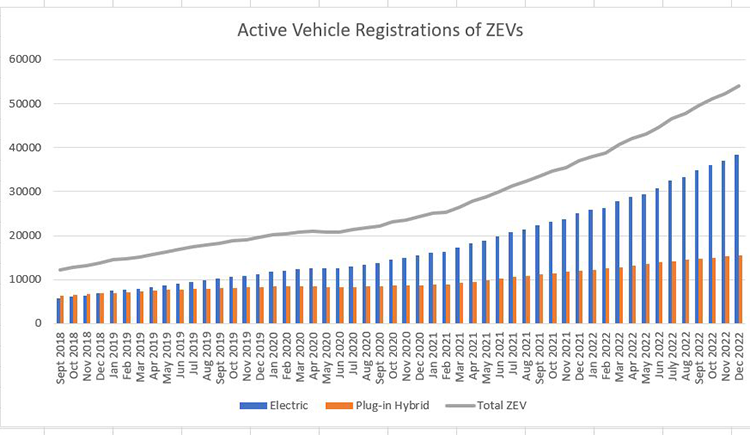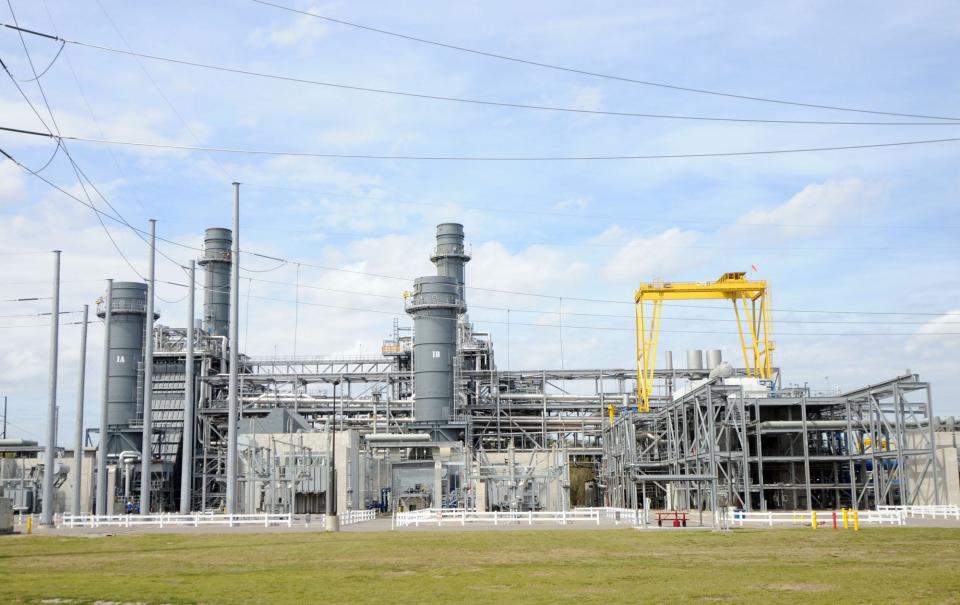How Gov. Cooper's executive orders have driven a lot of NC's green agenda

- Oops!Something went wrong.Please try again later.
- Oops!Something went wrong.Please try again later.
- Oops!Something went wrong.Please try again later.
As worries about the impacts of climate change have increased in recent years, North Carolina has stepped on the gas pedal to promote changes to help reduce the state's greenhouse gas emissions.
Goals set by Gov. Roy Cooper include having 1.25 million electric vehicles on the state's roads by 2030, up from roughly 52,000 at the end of 2022, and proposed rules to get more electric trucks and busses on North Carolina highways starting in 2027. He also has set aggressive targets for state agencies to get more energy efficient and promote "green" practices.
Cooper also wants to see 8 gigawatts of offshore wind power generated off the North Carolina coast by 2040, up from zero today.
"The private market is transitioning to a clean energy economy and the governor has used his executive authority to convene public and private stakeholders, set clear goals and prepare our state for market changes so that the companies leading this shift like Toyota, VinFast, Boom Supersonic and Wolfspeed, want to bring their high paying jobs to North Carolina," said Cooper spokesman Jordan Monaghan.
The moves to push a "green" agenda and move the Tar Heel State toward a clean energy future have drawn Cooper national acclaim, especially after North Carolina was seen as a laggard last decade − highlighted by legislators deciding to ignore scientific date on sea-level rise because it might damage the coastal property market. That led to the state being skewered by environmentalists and even late-night comedians, most notably Stephen Colbert.
'Response to political realities'
But even as North Carolina's embrace of green and clean energy initiatives have been gaining momentum, despite some Republican concerns the transition is being mandated too quickly, rough waters could be ahead.
It's not because public opinion is turning against pro-green measures, or there isn't enough money for the proposals. To the contrary, polls show more and more people − especially young people − see climate change as an increasingly important issue and President Biden has made accelerating the country's transition to a clean energy future a focal point of his administration, making billions of dollars available to help states, industries and individuals make the switch.
The potential problem is the governor's extensive use of executive orders.

CLIMATE CRISIS Why flooding from hurricanes in the Wilmington area could get a whole lot worse
While a powerful tool that can use the full force of the bureaucracy to push forward initiatives, executive orders don't carry the weight of law.
Dr. Chris Cooper, director of the Public Policy Institute at Western Carolina University, said by design the North Carolina governor isn't a powerful position. The state constitution makes it clear that the legislature is where the power is held.
Add large Republican majorities in both chambers of the N.C. General Assembly and that hasn't left Cooper a lot of ways to wield power or push his agenda.
"The one real tool at his disposal is the executive order, and he's been able to wield that little bit of power to great effect," Cooper, who isn't related to the governor, said.

That's not to say the governor hasn't worked with Republican leaders to get legislation passed. That includes House Bill 951, a bipartisan law requiring the N.C. Utilities Commission to take the necessary steps to reduce the state's carbon emissions by 70% from 2005 levels by the year 2030 and achieve carbon neutrality by 2050. After years of butting heads, Cooper and the GOP also recently crafted a deal to expand Medicaid in North Carolina.
But those examples of common ground have been the exception, not the norm.
Enter the executive order.
"It's a response to political realities," Cooper said. "Roy Cooper would rather get a bill moving through the legislature. But faced with the realities he has, he's exercising the one bit of power he has."
Dr. Aaron King, a political scientists at the University of North Carolina Wilmington, said executive orders allow a president or governor to show his supporters that he's working to get something done, that he hears their concerns and realizes action is needed even if there are legislative impediments to getting a bill passed.
"The benefit of executive orders is you don't really need the legislature, and you don't really need the public," he said. "You can act alone.
"But it's a Band-Aid, not a long-term solution."
'Stroke of a pen'
But if all it takes to create an executive order is a signature, that's all it takes to make it go away, too.
"There's nothing easier to undue than an executive order," Cooper said. "All it takes is a stroke of a pen."
He added that undoing executive orders of your predecessor, especially if that person was from a different political party, is a time-honored tradition played out in all state capitals and in Washington.
In May 2018, President Trump, a Republican, issued an executive order revoking an executive order signed by President Obama, a Democrat, in 2015 that set a goal of cutting the federal government's greenhouse gas emissions by 40% over 10 years. Trump's order changed that to mandate federal agencies look to cut energy use “in a manner that increases efficiency, optimizes performance, eliminates unnecessary use of resources, and protects the environment.”
Three years later, President Biden, also a Democrat, used his executive power to restore protections to several National Monuments and marine conservation areas that had been removed by Trump to open those areas up to mining and other developments.
THREAT RISK Plan to assess risk of climate change on insurance, including in NC, courts controversy
"It's standard practice," Cooper said of undoing the work of your political predecessor. "It happens everywhere, and all the time."
So could that put North Carolina's fast-track efforts to adopt more climate friendly measures in danger if a Republican becomes governor in 2024, since Cooper can't run again?
Maybe. But Cooper said the legacy of the executive orders, even if repealed, might be their true impact.
"The issue of climate change isn't something that's going to be solved during a governor's one or two terms," he said. "But what you can do is lay the foundation for moving forward."
King said executive orders, while often viewed as symbolic or aspirational, allow an executive to prioritize his goals − and send that message to his supporters that he is trying to get something done.
"It can have the influence of policy, but it doesn't have the staying power of law," he said. "But they can still have an impact."
Reporter Gareth McGrath can be reached at GMcGrath@Gannett.com or @GarethMcGrathSN on Twitter. This story was produced with financial support from 1Earth Fund and the Prentice Foundation. The USA TODAY Network maintains full editorial control of the work.
This article originally appeared on Wilmington StarNews: How Gov. Cooper's executive orders have fueled NC's push to go green

